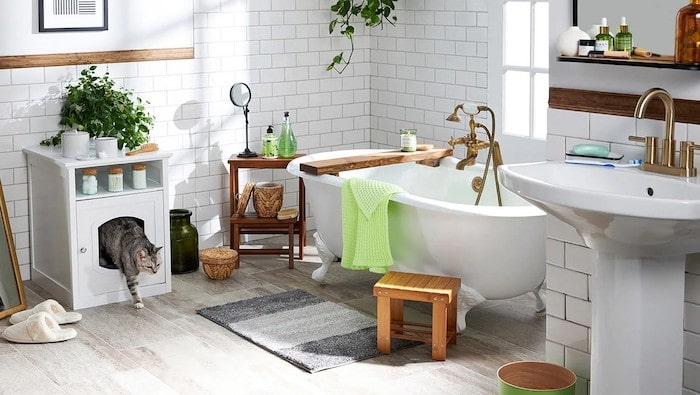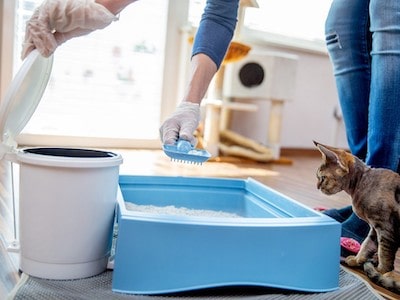Are you a proud cat owner who loves having your feline friend by your side? If so, you probably understand the challenge of maintaining a fresh and inviting bathroom when the litter box resides there.
The unmistakable odor of cat litter can quickly become a concern, especially when you’re preparing your home for potential buyers or simply want to create a pleasant environment for yourself and your guests.
But fret not! In this comprehensive guide, we will delve into practical and effective strategies to eliminate cat litter box smells in your bathroom.

From simple cleaning techniques to clever hacks, we’ll help you banish those unwanted odors and transform your bathroom into a fresh and welcoming space.
So, get ready to say goodbye to unpleasant smells and hello to a clean, odor-free oasis for both you and your furry companion!
Causes of Cat Litter Box Smell in Your Bathroom
There are many factors that can contribute to cat litter box smell in your bathroom. Some of the most common ones are:
Poor quality or dirty litter
The type and quality of litter you use can make a big difference in how well it absorbs and eliminates odors. Some litters are more absorbent, clumping, or odor-controlling than others.
If you use a low-quality or unsuitable litter for your cat or your bathroom, it may not be able to trap the urine and feces effectively and may release more smell into the air.
Moreover, if you do not change or scoop the litter regularly and properly, it may become saturated with waste and bacteria and produce more odor.
Inadequate ventilation or air circulation
The ventilation or air circulation in your bathroom can also affect how much cat litter box smell you have to deal with.
If your bathroom has poor ventilation or air circulation, such as no exhaust fan or window, the cat litter box smell may linger longer and become more concentrated in the air.
On the other hand, if your bathroom has good ventilation or air circulation, such as an exhaust fan or window, the cat litter box smell may dissipate faster and become less noticeable.
High humidity or moisture levels
The humidity or moisture levels in your bathroom can also influence how much cat litter box smell you experience. If your bathroom has high humidity or moisture levels, such as from showers or baths, the cat litter box smell may become more intense and persistent.
This is because humidity or moisture can enhance the evaporation and diffusion of odors into the air.
In addition, humidity or moisture can also promote the growth of mold and mildew in your bathroom, which can add to the unpleasant smell.

Lack of cleaning or maintenance
The cleaning or maintenance of your litter box and the surrounding area can also play a role in how much cat litter box smell you encounter. If you do not clean or maintain your litter box and the surrounding area frequently and thoroughly, you may end up with more odor sources and problems.
For example, if you do not clean or disinfect your litter box regularly, it may accumulate dirt, stains, bacteria, and residues that can emit more odor.
Similarly, if you do not clean or sanitize the floor, walls, rugs, or furniture around your litter box regularly, they may absorb or retain some of the urine or feces that may spill or splash from your litter box and produce more odor.
Medical issues or dietary habits of your cat
The medical issues or dietary habits of your cat can also affect how much cat litter box smell you have to cope with.
If your cat has any medical issues or dietary habits that may cause excessive or foul-smelling urine or feces, such as urinary tract infections (UTIs), kidney disease, diabetes mellitus (DM), inflammatory bowel disease (IBD), food allergies or intolerances or changes in diet or water intake you may notice more odor from their waste in your bathroom.
Moreover if your cat has any medical issues or dietary habits that may make them urinate or defecate outside their litter box such as arthritis cognitive dysfunction syndrome (CDS) stress anxiety or territorial marking you may find more odor sources in other places in your bathroom
Tips to Get Rid of Cat Litter Box Smell in Your Bathroom
Now that you know some of the causes of cat litter box smell, let’s look at some of the best ways to get rid of the smells in your bathroom:
1) Choosing the right type and amount of litter for your cat: There are many types of litter available in the market, such as clumping, non-clumping, scented, unscented, natural, synthetic, etc. You need to find out what type of litter your cat prefers and what works best for odor control.
Generally, clumping and unscented litter are more effective at absorbing and locking in odor than non-clumping and scented litter.
You also need to make sure that you use enough litter to cover the bottom of the box by at least 2 inches, but not too much that it spills over or makes it hard for your cat to dig.
2) Placing the litter box in a well-ventilated and accessible location: You need to find a spot in your bathroom that has good air circulation and natural light, but also provides some privacy and security for your cat.
You can also use a fan or an air purifier to improve the ventilation and filter out the odor. You should avoid placing the litter box near any heat sources or humid areas that can amplify the smell.
You should also make sure that the litter box is easy to access and clean for you and your cat.

3) Cleaning the litter box regularly and thoroughly: You need to scoop out the waste from the litter box at least once a day, and replace the entire litter every week or two depending on how often you use it.
You should also wash the litter box and its accessories with hot water and bleach once a month to kill any bacteria or mold that may be lurking inside. You should also use disposable liners or bags to make it easier to dispose of the used litter without making a mess.
4) Using odor-neutralizing products or natural remedies: You can use some products or substances that can help neutralize or mask the odor of the litter box, such as baking soda, charcoal filters, vinegar, lemon juice, coffee grounds, etc.
You can sprinkle some baking soda on top of the litter or mix it with water and spray it on the litter box to absorb the odor. You can also place some charcoal filters or coffee grounds near the litter box to trap the odor molecules.
You can also use vinegar or lemon juice to wipe down the litter box and its surroundings to remove any stains or residues that may cause odor.
5) Consulting your vet if your cat has any health problems or behavioral changes: If you suspect that your cat has any medical issues or allergies that affect its waste production or elimination habits, you should take it to your vet as soon as possible.
Your vet can diagnose and treat any underlying conditions that may be causing the odor problem. They can also advise you on how to modify your cat’s diet or lifestyle to improve its digestion and urinary health.
FAQ
How often should I clean the litter box to minimize odors?
It’s recommended to scoop the litter box at least once a day to remove waste. Additionally, a thorough cleaning of the litter box and changing the litter completely should be done every 1-2 weeks.
How can I improve ventilation in my bathroom to reduce odors?
Ensure that your bathroom has proper ventilation, such as using an exhaust fan or opening windows, to allow fresh air to circulate. This helps to minimize the concentration of odors and prevent them from lingering.
Should I consider using a covered litter box to control odors?
Covered litter boxes can help contain odors and provide more privacy for your cat. However, some cats may not prefer them, so it’s important to observe your cat’s behavior and comfort level with a covered box.
Are there any natural remedies I can use to combat litter box odors?
Yes, there are a few natural remedies you can try. Placing baking soda or activated charcoal near the litter box can help absorb odors. Additionally, incorporating odor-neutralizing plants like bamboo or spider plants can help freshen the air in your bathroom.
Conclusion
Eliminating litter box odors in your bathroom is not only essential for your comfort but also crucial when preparing your home for potential buyers or creating a pleasant environment for yourself and guests. By implementing the tips and strategies outlined in this guide, you can successfully tackle those unwanted smells and transform your bathroom into a fresh and inviting space.
Remember, regular maintenance and cleaning of the litter box are key to minimizing odors. Scooping the litter daily, performing thorough cleanings, and changing the litter regularly are all essential steps.
Additionally, incorporating proper ventilation, using odor-neutralizing products or natural remedies, and considering a covered litter box can significantly help in controlling and eliminating odors.
Maintaining a clean and odor-free bathroom not only benefits you but also ensures the well-being and comfort of your feline companion. By taking proactive measures and following the suggestions provided, you can create a harmonious coexistence between your bathroom and the litter box.
So, bid farewell to those unpleasant smells and welcome a fresh, inviting bathroom that everyone can appreciate. With a little effort and the right approach, you can conquer litter box odors and enjoy a clean and pleasant bathroom environment.
